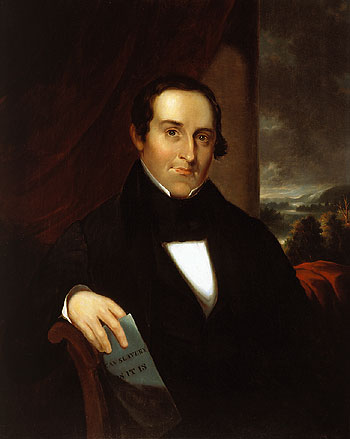 National Portrait Gallery |
James A. Thome James A. Thome was born on January 20, 1813, in Augusta, KY. He was the son of Arthur Thome, a slaveholder with a flourishing flour mill. After receiving a basic education at Augusta College in Kentucky, James Thome taught for a while at various schools in the Northeast. During this time he became a supporter of the abolitionist cause. His decision to become an abolitionist put him at odds with his slaveholding father, who initially disowned him. The two of them were later reconciled, however, and Arthur Thome emancipated his slaves in 1834-38. |
| James Thome entered
Lane Seminary in Cincinnati in 1833 and took part in the 1833 and 1834
debates organized by Theodore Weld on the slavery question, delivering
a speech in support of immediatism based on his personal experiences as
the son of a Southern slaveholder entitled The Southern Slave Kitchen,
The Sodom of the Nation.
Thome left Lane Seminary for Oberlin College along with thirty-one other
seminary students and graduated from Oberlin in 1836.
Soon after his graduation, Thome was commissioned along with J. Horace Kimball, editor of the Herald of Freedom, by the American Anti-Slavery Society to observe and report the effects of emancipation in the West Indies. The two of them spent six months in the West Indies and traveled to Antigua, Barbados and Jamaica. Their account was published in 1838 under the title Emancipation in the West Indies, and served as an influential abolitionist text. On September 25, 1838, James Thome married Ann T. Allen, who had attended Oberlin College from 1835 through 1836. Also in 1838 Thome accepted a position as Professor of Rhetoric and Belles Lettres at Oberlin College, which he held until 1848. He served as the chair of the department until 1862 and was elected to the Oberlin College Board of Trustees in 1851. He left Oberlin in 1848 to become pastor of the First Presbyterian Church of Brooklyn, OH (now First Congregational Church) in Cleveland and served that congregation until 1871. During this time he also wrote for various antislavery papers and served as a special correspondent for the Cleveland Leader. He also worked as an agent of the American Missionary Association in England and Scotland in 1867 and 1868, raising money for freed people. From 1871 up until his death, Thome served as pastor of the First Congregational Church in Chattanooga, TN. He died on March 4, 1873 from pneumonia. Letter from James
A. Thome to one of his brothers concerning the capture of Augusta, KY: |
|